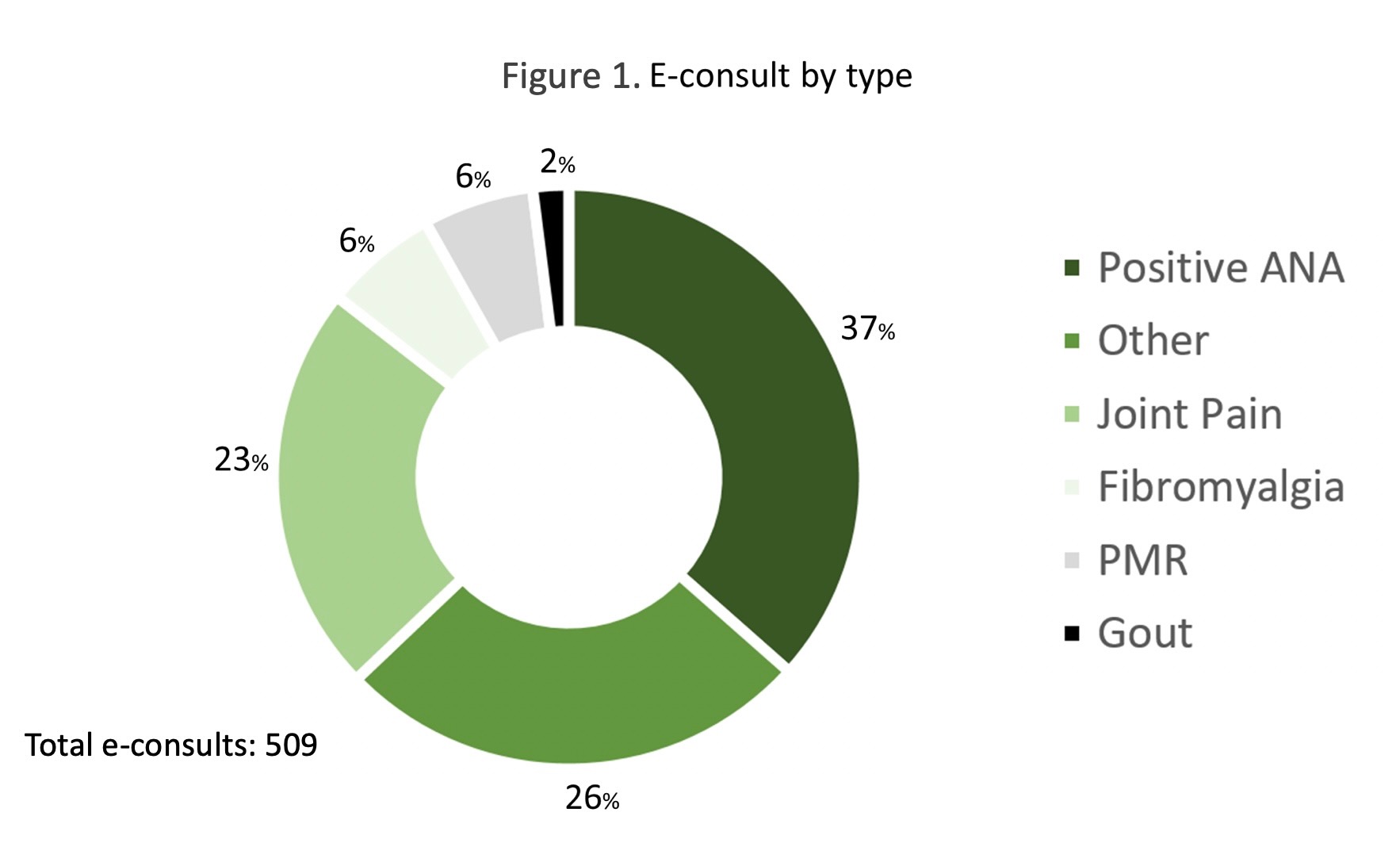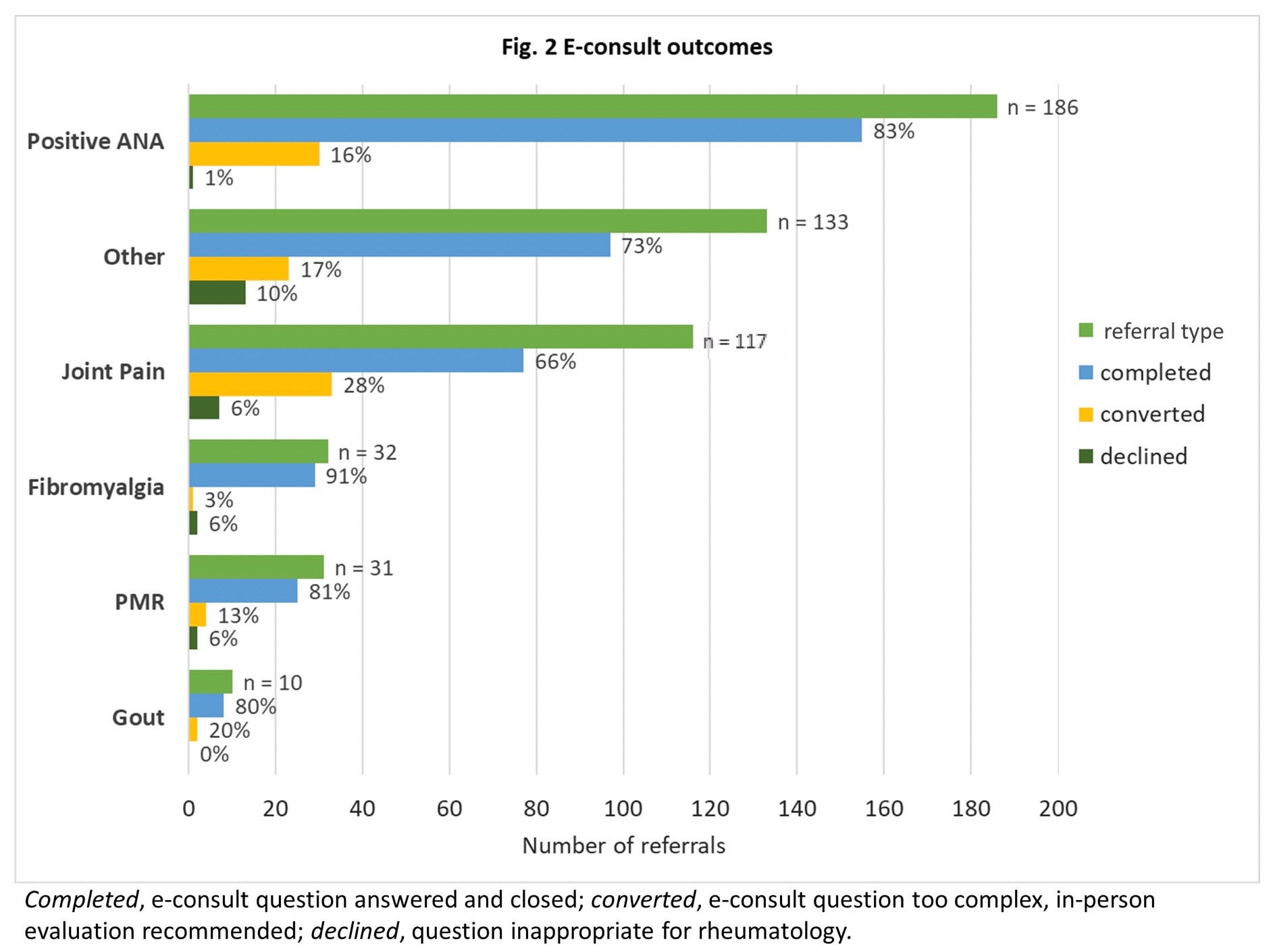Session Information
Session Type: Poster Session B
Session Time: 10:30AM-12:30PM
Background/Purpose: Access to rheumatologic care is severely limited at our academic medical center with wait times of 9 months or longer for routine new patient visits. Prior examination of joint pain referrals to our rheumatology clinic highlighted important delays in the evaluation of new inflammatory arthritis and incomplete or inappropriate testing at the time of referral, hindering effective triage. We implemented electronic consults (e-consults) to rheumatology in October 2022 as one of several interventions to improve access. In this first phase of the project, we described the number of e-consults by question and outcome, and the turnaround time from placement to resolution. The second phase of the project will examine changes in access following e-consult implementation compared to pre-intervention data.
Methods: E-consult data were collected using Epic SQL reporting tools. Eligible records included all adult (age ≥ 18) e-consults to the rheumatology division between October 1, 2022 and September 30, 2023. The panel of e-consult questions, shown in Figure 1, was available only to physicians and advanced practice providers within the health network via the electronic medical record. There were three possible e-consult outcomes: completed (e-consult question answered), converted (question deemed too complex for e-consult with in-person evaluation recommended), or declined (question inappropriate for rheumatology or incomplete information provided). Mean turnaround time (TAT) represented the time from e-consult placement to closure, expressed in days.
Results: A total of 509 rheumatology e-consults were received over the one-year period, with “Positive ANA” the most common consult question at 37%. “Other,” which included diverse clinical questions ranging from fatigue to interstitial lung disease, accounted for 26%, “Joint Pain” 23%, “Fibromyalgia” and “PMR” 6% each, and “Gout” 2% of total e-consults. E-consults for “Fibromyalgia” (n=32) had the highest completion rate at 91%, followed by “Positive ANA” (n=186) at 83%. “Joint Pain” (n=133) had the highest rate of conversion at 28% with 66% completed. E-consults for “Other” were declined at the highest rate (10%). Mean turnaround time for e-consults by outcome ranged from 0.61 days for completed to 0.98 days for declined.
Conclusion: E-consults will be an important tool in a multipronged approach to improve rheumatology access. Given the observed mean TAT of less than one day for all e-consults, we feel confident this intervention will achieve the primary aim of reduced wait times overall, defined as the time from placement of any type of rheumatology referral to any type of rheumatology visit (e-consult, in-person or telemedicine), when compared with historical data. This project provides essential data on referral trends to help establish future e-consult targets and to determine the institutional resources needed to support the initiative. Project data will also inform future iterations of our enhanced referral panels and identify areas for educational outreach.
Disclosures: J. Gosselin: None; B. Thoms: None; B. Libman: American college of physicians, 12, Clinical Editor; T. Morrison: None; G. McLane: None; T. Fama: None.
To cite this abstract in AMA style:
Gosselin J, Thoms B, Libman B, Morrison T, McLane G, Fama T. Electronic Consults to Rheumatology: A One-Year Analysis of Referral Outcomes and Trends in Access [abstract]. Arthritis Rheumatol. 2024; 76 (suppl 9). https://acrabstracts.org/abstract/electronic-consults-to-rheumatology-a-one-year-analysis-of-referral-outcomes-and-trends-in-access/. Accessed .« Back to ACR Convergence 2024
ACR Meeting Abstracts - https://acrabstracts.org/abstract/electronic-consults-to-rheumatology-a-one-year-analysis-of-referral-outcomes-and-trends-in-access/



